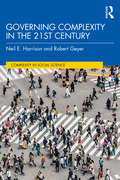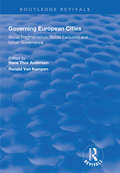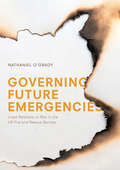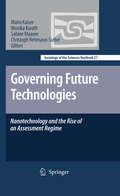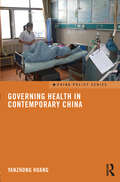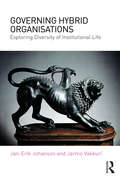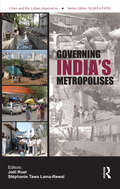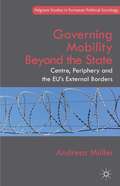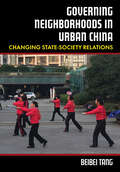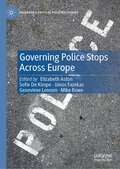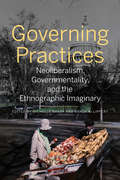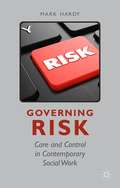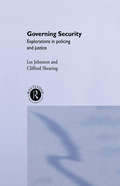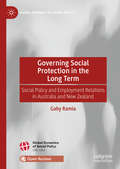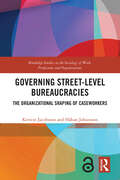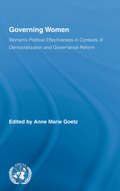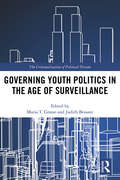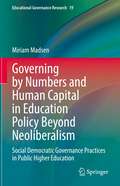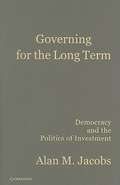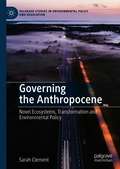- Table View
- List View
Governing Complexity in the 21st Century (Complexity in Social Science)
by Neil E. Harrison Robert GeyerGoverning Complexity in the 21st Century surveys the ways in which social systems are becoming more complex. It shows how this complexity impacts every aspect of life for individuals, governments and societies in most social systems at individual, regional, national and global scales and explores how embracing ‘complexity thinking’ can greatly improve the art of governance in all policy areas. The book clearly explains the ideas and methods of complexity science—widely accepted in both the natural and social sciences—then demonstrates how ‘complexity thinking’ can be applied to improve our understanding of governance and policy actions. Providing a deep analysis of many governance challenges, including economic development and technological innovation, environment management, climate change and development in the Middle East, the book also compares national responses to the COVID-19 pandemic. Clear and jargon-free, this book is accessible to undergraduates and scholars alike. It is essential reading for policymakers everywhere, showcasing methods for governing effectively and efficiently in our increasingly complex world. It brings together the broad range of social and environmental science fields and will be useful for those studying or working in policy, politics and international relations, environmental issues, business management, philosophy, history and sociology.
Governing Cotton
by Adam SneydThis book traces the historic relationships between cotton production, the international cotton trade and poverty south of the Sahara, and assesses various approaches to corporate social responsibility and nongovernmental policy advocacy in this area.
Governing European Cities: Social Fragmentation, Social Exclusion and Urban (Routledge Revivals)
by Hans Thor AndersenThis title was first published in 2001. This volume is a result of the action COST A9 "Civitas - Transformation of European Cities and Urban Governance", launched in 1995, which looks at the emergence of the urban question. The COST framework is a European mechanism to provide scientific and technical assistance for national research programmes. The text covers the change in the importance of European cities and analyzes how each city re-formulates its policies and methods of governing in response to these changes. This text is to analyze the new forms of urban governance using three points of view, a statistical approach, an economic approach and a sociological approach. This book tackles the fragmentation and social exclusion that occurs in urban society and explores the different forms it takes throughout Europe. It also presents some strategies to combat or at least regulate this fragmentation, to ensure a united European city.
Governing Families: Problematising Technologies in Social Welfare and Criminal Justice (Routledge Advances in Sociology)
by Rosalind Edwards Pamela UgwudikeThis book provides a focused discussion of how families are governed through technologies. It shows how states attempt to influence, shape and govern families as both the source of and solution to a range of social problems including crime. The book critically reviews family governance in contemporary neo-liberal society, notably through technologies of self-responsibilisation, biologisation, and artificial intelligence. The book draws attention to the poor working class and racialised families that often are marked out and evaluated as culpable, dysfunctional, and a threat to economic and social order, obscuring the structural inequalities that underpin family lives and discriminations that are built into the tools that identify and govern families. Filling a gap where disciplinary perspectives cross-cut, this book brings together sociological and criminological perspectives to provide a unique cross-disciplinary approach to the topic. It will be of interest to researchers, scholars and lecturers studying sociology and criminology, as well as policy-makers and professionals working in the fields of early years and family intervention programmes, including in social work, health, education, and the criminologically-relevant professions such as police and probation.
Governing Future Emergencies: Lived Relations to Risk in the UK Fire and Rescue Service
by Nathaniel O'GradyThe 21st century has born witness to myriad changes in the way the world is secured from the many emergencies that continually threaten to disrupt it. This book concentrates on two such changes. First, it takes stock of the ever-increasing development and diversification of data and digital technologies that security organisations have at their disposal. Secondly, it examines how these digital devices have fostered a new direction in which security agencies primarily conceive of emergencies as so many risks of the future. Emergency governance has undergone what might be called an anticipatory turn here, with digitally rendered and imagined scenes of future contingency becoming cause and justification for intervention in the here and now. Rather than scrutinising this turn at its most spectacular heights in the domains, for instance, of warfare or counter-terrorism, the book explores the facilitation of risk governance through digital technologies in a more quotidian incarnation; namely by tracing the steps that the United Kingdom’s Fire and Rescue Service (FRS) take to govern fire emergencies whose potential has been identified but have yet to unfold. Delving into the FRS, the book maps out a digital infrastructure that includes various software, institutional processes, multiple forms of risk calculation but also human beings, relations and consciousness and an array of material spaces in which these things exist. Accentuated here is how these components assemble to produce projections of future emergencies on a number of sensorial registers. This infrastructure is shown, in turn, to inform and shape a catalogue of refined modes of action through which interventions on future emergencies are made in the present. Engaging in depth with this infrastructure, the FRS provides an understanding of risk as a lived relation, risk as an organisational ethos whose liveliness is founded upon and reverberates through the relations existing between those people and things operating in the FRS to make sense of potential fire emergencies. Using the concept of lived relation as a foundation, the book develops a critical understanding of anticipatory governance by grasping its resonance with issues emanating in the wider field of security, showing how security figures as a set of practices that rely upon and cultivates affective conditions, that enrols the force of elements like fire into its institutional arrangement, that draw on an array of knowledges to exercise power and, in the process, that instantiate new forms of subjectivity.
Governing Future Technologies
by Christoph Rehmann-Sutter Sabine Maasen Mario Kaiser Monika KurathNanotechnology has been the subject of extensive 'assessment hype,' unlike any previous field of research and development. A multiplicity of stakeholders have started to analyze the implications of nanotechnology: Technology assessment institutions around the world, non-governmental organizations, think tanks, re-insurance companies, and academics from science and technology studies and applied ethics have turned their attention to this growing field's implications. In the course of these assessment efforts, a social phenomenon has emerged - a phenomenon the editors define as assessment regime. Despite the variety of organizations, methods, and actors involved in the evaluation and regulation of emerging nanotechnologies, the assessment activities comply with an overarching scientific and political imperative: Innovations are only welcome if they are assessed against the criteria of safety, sustainability, desirability, and acceptability. So far, such deliberations and reflections have played only a subordinate role. This book argues that with the rise of the nanotechnology assessment regime, however, things have changed dramatically: Situated at the crossroads of democratizing science and technology, good governance, and the quest for sustainable innovations, the assessment regime has become constitutive for technological development. The contributions in this book explore and critically analyse nanotechnology's assessment regime: To what extent is it constitutive for technology in general, for nanotechnology in particular? What social conditions render the regime a phenomenon sui generis? And what are its implications for science and society?
Governing Health in Contemporary China (China Policy Series)
by Yanzhong HuangThe lack of significant improvement in people’s health status and other mounting health challenges in China raise a puzzling question about the country’s internal transition: why did the reform-induced dynamics produce an economic miracle, but fail to reproduce the success Mao had achieved in the health sector? This book examines the political and policy dynamics of health governance in post-Mao China. It explores the political-institutional roots of the public health and health care challenges and the evolution of the leaders’ policy response in contemporary China. It argues that reform-induced institutional dynamics, when interacting with Maoist health policy structure in an authoritarian setting, have not only contributed to the rising health challenges in contemporary China, but also shaped the patterns and outcomes of China’s health system transition. The study of China’s health governance will further our understanding of the evolving political system in China and the complexities of China’s rise. As the world economy and international security are increasingly vulnerable to major disease outbreaks in China, it also sheds critical light on China’s role in global health governance.
Governing Human Lives and Health in Pandemic Times: Social Control Policies (Routledge Advances in Sociology)
by Matilda HellmanGoverning Human Lives and Health in Pandemic Times looks into the instruments and the type of reasoning involved when large-scale social control strategies were implemented worldwide in response to the COVID-19 pandemic. The repertoires of institutional and administrative governance tools used during the pandemic are studied in their unique institutional, socio-geographic and cultural settings, in order to form an understanding of the political climates and the values inscribed in current societal contracts. The book is intended for academic audiences interested in policy research, health governance, and civil societal issues. It will be of great relevance and use for a wide audience of policy-makers, public officials and health care planners as well as students in a broad range of disciplines.
Governing Hybrid Organisations: Exploring Diversity of Institutional Life
by Jan-Erik Johanson Jarmo VakkuriIntuitively, organisations can easily be categorised as ‘public’ or ‘private’. However, this book questions such a black and white dichotomy between public and private, and seeks a deeper understanding of hybrid organisations. These organisations can be found at micro, meso and macro levels of societal activity, consisting of networks between companies, public agencies and other entities. The line between these two realms is increasingly blurred — giving rise to hybrid organisations. Governing Hybrid Organisations presents an engaging discussion around hybrid organisations, highlighting them as important and fascinating examples of modern institutional diversity. Chapters examine the changing landscape of service delivery and the nature and governance of hybrid organisations, using international examples and cases from different service contexts. The authors put forward a clear analytical framework for understanding hybrid governance, looking at strategy and performance management. This text will be valuable for students of public management, public administration, business management and organisational studies, and will also be illuminating for practising managers.
Governing India's Metropolises: Case Studies of Four Cities (Cities and the Urban Imperative)
by Stéphanie Tawa Lama-Rewal Joël RuetThis book is a comparative, sector-based study of the changing character of governance in Indian metropolises in the 2000s. Highlighting the horizontal and vertical ties of the participatory groups, both state and non-state, it looks at key civic issues.
Governing Indigenous Territories: Enacting Sovereignty in the Ecuadorian Amazon
by Erazo Juliet S.Governing Indigenous Territories illuminates a paradox of modern indigenous lives. In recent decades, native peoples from Alaska to Cameroon have sought and gained legal title to significant areas of land, not as individuals or families but as large, collective organizations. Obtaining these collective titles represents an enormous accomplishment; it also creates dramatic changes. Once an indigenous territory is legally established, other governments and organizations expect it to act as a unified political entity, making decisions on behalf of its population and managing those living within its borders. A territorial government must mediate between outsiders and a not-always-united population within a context of constantly shifting global development priorities. The people of Rukullakta, a large indigenous territory in Ecuador, have struggled to enact sovereignty since the late 1960s. Drawing broadly applicable lessons from their experiences of self-rule, Juliet S. Erazo shows how collective titling produces new expectations, obligations, and subjectivities within indigenous territories.
Governing Mobility Beyond the State: Centre, Periphery and the EU's External Borders (Palgrave Studies in European Political Sociology)
by Andreas MüllerThis book explores the structural tensions and conflicts that arise with the abolition of border controls between the EU's member states and how this conflict ridden relationship affects and is affected by the institutional shape of the EU's external borders.
Governing Neighborhoods in Urban China: Changing State-Society Relations
by Beibei TangGoverning Neighborhoods in Urban China examines the key mechanisms operating at the grassroots level in China that contribute to urban development and increased public support for the legitimacy and authority of the Chinese state. Beibei Tang uncovers new trends and dynamics of urban neighborhood governance since the 2000s to reveal the significant factors that contribute to regime survival. Tang introduces the concept of hybrid authoritarianism, a governance mechanism an authoritarian state employs to produce governance legitimacy, public support, and regime sustainability. Hybrid authoritarianism is situated in an intermediary governance space between state and society. It accommodates both state and non-state actors, deals with a wide range of governance issues, employs flexible governance strategies, and in this context, ultimately strengthens CCP leadership. Tang documents processes of hybrid authoritarianism through her focus on various types of urban neighborhoods, including new urban middle-class neighborhoods, and the increasing urbanization of the countryside. Governing Neighborhoods in Urban China provides a conceptual framework that avoids scholarly approaches that tend to reify either one-party autocracy or Western-centric notions of democracy.
Governing Police Stops Across Europe (Palgrave's Critical Policing Studies)
by Elizabeth Aston Mike Rowe Genevieve Lennon Sofie De Kimpe János FazekasThis book takes a critical and comparative approach to the analysis of the governance of police stops across Europe. It draws on an EU COST Action research network on Police Stops which engaged academics and practitioners from 29 countries to better understand the practice of police stops. It begins by examining how police stops are defined and the various legal rules and levels of accountability afforded. The chapters are arranged by theme to focus on a core aspect of the governance of police stops. These include: legal frameworks and police discretion; internal governance; external accountability and civilian oversight; possibilities for legal recourse; and the different roles of data and technology. Each compares the distinct approaches evident across Europe, often employing case studies. The book adopts a critical approach, acknowledging governance as contested and involving diverse (state, non-state and supranational) actors. It considers implications for policing in a rapidly changing environment globally.
Governing Practices: Neoliberalism, Governmentality, and the Ethnographic Imaginary
by Randy K. Lippert Michelle BradyNeoliberalism is among the most commonly used concepts in the social sciences. Furthermore, it is one of the most influential factors that have shaped the formation of public policy and politics. In Governing Practices, Michelle Brady and Randy Lippert bring together prominent scholars in sociology, criminology, anthropology, geography, and policy studies to extend and refine the current conversation about neoliberalism. The collection argues that a new methodological approach to analyzing contemporary policy and political change is needed. United by the common influence of Foucault's governmentality approach and an ethnographic imaginary, the collection presents original research on a diverse range of case studies including public-private partnerships, the governance of condos, community and state statistics, nanopolitics, philanthropy, education reform, and pay-day lending. These diverse studies add considerable depth to studies on governmentality and neoliberalism through a focus on governmental practices that have not previously been the focus of sustained analysis.
Governing Risk
by Mark HardyDrawing on Foucault's later work on governmentality, this book traces the effects of 'the rise of risk' on contemporary social work practice. Focusing on two 'domains' of practice mental health social work and probation work it analyses the ways in which risk thinking has affected social work's aims and objectives, methods and approaches. It critically interrogates the claim that the logic of actuarialsim is implicated in a shift from 'care' to 'control' and argues the case for a distinctive approach to understanding and undertaking social work which does justice to the reality of contemporary practice. "
Governing Security: Explorations of Policing and Justice
by Les Johnston Clifford D. ShearingGovernment has been radically transformed over the past few decades. These transformations have been mirrored in, and often prefigured by, changes in the governance of security - mentalities, institutions, technologies and practices used to promote secure environments. This book traces the nature of these governmental changes by looking at security. It examines a variety of related questions, including:* What significant changes have occurred in the governance of security? * What implications do these changes have for collective life? * What new imaginings may be needed to reshape security? * What ethical factors need to be considered in formulating such new imaginings?The authors conclude bringing together descriptive, explanatory and normative considerations to access how justice can be conceived within the governance of security.
Governing Social Protection in the Long Term: Social Policy and Employment Relations in Australia and New Zealand (Global Dynamics of Social Policy)
by Gaby RamiaThis open access book examines the comparative evolution of social protection in Australia and New Zealand from 1890 to the present day, focusing on the relationship between employment relations and social policy. Utilising longstanding and more recent developments in historical institutionalist methodology, Ramia investigates the relationship between these two policy domains in the context of social protection theory. He argues that treating employment relations as dynamic, and as inextricably intertwined with changes in the welfare state over time, allows for more accurate portrayal of similarity and difference in social protection. The book will be of most interest to researchers, advanced undergraduate and postgraduate students in social policy, employment relations, public policy, social and political history, and comparative politics.
Governing Street-Level Bureaucracies: The Organizational Shaping of Caseworkers (Routledge Studies in the Sociology of Work, Professions and Organisations)
by Håkan Johansson Kerstin JacobssonThis book examines how caseworkers are governed in today’s street-level bureaucracies. It redefines our understanding of public sector governance by highlighting the subtle, informal, and everyday forms of organizational governance that shape caseworkers’ subjectivities beyond formal policies and professional identities. Based on four distinct types of normative governance – ‘governance by discourse’, ‘governance by emotions’, ‘governance by peers’, and ‘governance by numbers, colours, and symbols’, the book shows how caseworkers are shaped as organizational staff members alongside their roles as welfare professionals and welfare state bureaucrats. Governing Street-Level Bureaucracies will be of interest to scholars and students in organizational sociology, street-level bureaucracy research, public administration, and critical management studies. It also provides valuable insights for policymakers and practitioners seeking to understand caseworkers’ responses to public governance and public sector reforms.
Governing The Press: Media Freedom In The U.s. And Great Britain
by Deborah HolmesJealously guarded and frequently defended, the concept of freedom of the press is still subject to widely varying interpretations in different democratic systems. This book compares and contrasts the ways in which the system limits and defines press freedom in two nations known for an unfettered press-the United States and Great Britain. Examining
Governing Women: Women’s Political Effectiveness in Contexts of Democratization and Governance Reform (Routledge/UNRISD Research in Gender and Development)
by Anne Marie GoetzThough the proportion of women in national assemblies still barely scrapes 16% on average, the striking outliers - Rwanda with 49% of its assembly female, Argentina with 35%, Liberia and Chile with new women presidents this year - have raised expectations that there is an upward trend in women's representation from which we may expect big changes in the quality of governance. But getting women into public office is just the first step in the challenge of creating governance and accountability systems that respond to women's needs and protect their rights. Using case studies from around the world, the essays in this volume consider the conditions for effective connections between women in civil society and women in politics, for the evolution of political party platforms responsive to women's interests, for local government arrangements that enable women to engage effectively, and for accountability mechanisms that answer to women. The book's argument is that good governance from a gender perspective requires more than more women in politics. It requires fundamental incentive changes to orient public action and policy to support gender equality.
Governing Youth Politics in the Age of Surveillance (The Criminalization of Political Dissent)
by Judith Bessant Maria T. GrassoDrawing on case studies from around the world, contributors to this ground-breaking book explore a major contemporary paradox: on the one hand, young people today are at the forefront of political campaigns promoting social rights and ethical ideas that challenge authoritarian orders and elite privileges. On the other hand, too many governments, some claiming to be committed to liberal-democratic values, social inclusion and youth participation are engaged in repressing political activities that contest the status quo. Contributors to this book explore how, especially since 9/11, governments, state agencies and other traditional power holders around the globe have reacted to political dissent authored by young people. While the ‘need’ to enhance ‘youth political participation’ is promoted, the cases in this book document how states are using everything from surveillance, summary offences, expulsion from universities, ‘gag laws’ and ‘antiterrorism’ legislation, and even imprisonment to repress certain forms of young people’s political activism. These responses diminish the public sphere and create civic spaces hostile to political participation by any citizen. This book forms part of The Criminalization of Political Dissent series. It documents and interprets the many ways contemporary governments and agencies now routinely use various techniques to repress and criminalise political dissent.
Governing by Numbers and Human Capital in Education Policy Beyond Neoliberalism: Social Democratic Governance Practices in Public Higher Education (Educational Governance Research #19)
by Miriam MadsenThis book addresses governing by numbers and human capital policy in higher education by asking how higher education is quantified, how the quantitative information is used in educational governance, and how the information is perceived by students, teachers, managers, and policymakers, and affects decision-making. It also thematically discusses how human capital theory affects the quantification practices and, thereby, their effects. Based on these analyses, the book asks whether governing by numbers and human capital in education policy are necessarily neoliberal practices, and thus questions the theory of global convergence in educational governance.The book provides a thorough analysis of the quantification of graduate outcomes based on the philosophical framework of Agential Realism, thus offering a novel analytical approach to the study of data and indicators in educational governance. The book draws on a comprehensive ethnographic case study from Danish higher education, and relates the findings from this case study to empirical cases in other countries and international research in the field. The book brings together literature from various fields, including political science, accounting, education, and sociology of quantification, in order to provide a comprehensive account of how quantification practices affect education.
Governing for the Long Term
by Alan M. JacobsIn Governing for the Long Term, Alan M. Jacobs investigates the conditions under which elected governments invest in long-term social benefits at short-term social cost. Jacobs contends that, along the path to adoption, investment-oriented policies must surmount three distinct hurdles to future-oriented state action: a problem of electoral risk, rooted in the scarcity of voter attention; a problem of prediction, deriving from the complexity of long-term policy effects; and a problem of institutional capacity, arising from interest groups' preferences for distributive gains over intertemporal bargains. Testing this argument through a four-country historical analysis of pension policymaking, the book illuminates crucial differences between the causal logics of distributive and intertemporal politics and makes a case for bringing trade-offs over time to the center of the study of policymaking.
Governing the Anthropocene: Novel Ecosystems, Transformation and Environmental Policy (Palgrave Studies in Environmental Policy and Regulation)
by Sarah ClementThis book focuses on the present and future challenges of managing ecosystem transformation on a planet where human impacts are pervasive. In this new epoch, the Anthropocene, the already rapid rate of species loss is amplified by climate change and other stress factors, causing transformation of highly-valued landscapes. Many locations are already transforming into novel ecosystems, where new species, interactions, and ecological functions are creating landscapes unlike anything seen before. This has sparked contentious debate not just about science, but about decision-making, responsibility, fairness, and human capacity to intervene. Clement argues that the social and ecological reality of the Anthropocene requires modernised governance and policy to confront these new challenges and achieve ecological objectives. There is a real opportunity to enable society to cope with transformed ecosystems by changing governance, but this is notoriously difficult. Aimed at anyone involved in these conversations, be those researchers, practitioners, decision makers or students, this book brings together diffuse research exploring how to confront institutional change and ecological transformation in different contexts, and provides insight into how to translate governance concepts into productive pathways forward.
